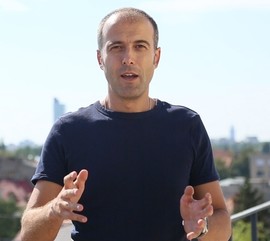
What is the course about?
In the World Economic Forum 2016 report "Future of Jobs", chief HR and strategy officers from leading global employers predicted that Critical Thinking will become the 2nd most important skill for employees by 2020. It's no surprise. In today's rapidly changing business landscape, knowing how to quickly navigate complex problems, break down constant incoming information and respond to new situations puts professionals at an incredible advantage.
Do you need to convince a client? If you structure your proposal like a mathematician and write it like a columnist, you will. This course will provide you with better tools for understanding and approaching challenges in today's business environment. We will analyse the logical structure behind business proposals, business strategies and everyday plain communication, in order to make more informed and better decisions. We will test the assumptions and hypotheses in our business models, understand the mechanisms of bad reasoning (fallacies) and learn how to respond to and avoid being misled in communication. Cognitive biases affect our behaviour as consumers, managers or entrepreneurs - in this course, we will understand how that happens and how we can combat as well as work with these biases. Finally, you will better discover your own ways of thinking, both conscious and unconscious, testing and challenging your own cognitive strengths and weaknesses.
Course Structure
Chapter 1: Introduction
What is Critical Thinking and why is it important in the business environment?
Chapter 2: We think in arguments
We get to see the logic structure behind any text or speech in business communication. We learn when to trust statements, hidden assumptions, opinions and beliefs (including our own). We evaluate business proposals, business strategy, in order to be able to make better decisions. All this will be organised with a step-by-step approach alongside relevant examples.
Chapter 3: Don't be fooled! Fallacies and Cognitive Biases
We are often misled by bad reasoning (fallacies), regardless if the bad reasoning comes from the others (with or without intent) or from ourselves. Sometimes we make mistakes without thinking at all (cognitive biases). But when such concepts can be named, studied and exemplified, we are less likely to err again. In this chapter there is also a unit on the smart use of heuristics in business.
Chapter 4: Test your assumptions
All the things that we know about the way our world functions (all sciences) are based on the scientific method. The corner stone of validating a scientific theory is designing and conducting well thought out experiments. Why shouldn’t we do the same in business? Every strategy is based on some assumptions and hypotheses. Instead of basing our business conduct on a hunch, let’s recognise our assumptions and then design and conduct clever tests for them.
Chapter 5: Persuasion
We will put our skills to work and construct good arguments in order to be persuasive in writing, debates and pitches.
Chapter 6: How to be a critical thinker in a post-truth world?
Today's media is dominated by post-truth in ways that were unthinkable two decades ago. We get most of our news from Facebook, we live in bubbles and echo-chambers. And this influences greatly our lives and our businesses. We dissect the phenomenon and provide some tools to tackle it.
Chapter 7: The courage to change your mind
Once we master critical thinking skills, we need to use them charitably and responsibly. Most importantly, we need to start by using them on our own businesses and on ourselves. It is easier to use critical thinking on the others, and not on ourselves, on our own strong beliefs and old misconceptions. We describe 9 mechanisms through which our minds cling to old beliefs (among these - groupthink, cognitive dissonance, backfire effect) and ways to counteract these mechanisms..
What is included in this course
By enrolling in this course, you will gain access to:
• All Course Material
• Challenging & Fun Assignments
• Interactive Global Community
• Flexible Time Management
Upon completion of this course, you will receive:
• A Statement of Participation
In addition, this course offers flexible time management. With a workload of 12-16 hours, the suggested course length is about 4-5 weeks. If you can’t spare 3-4 hours a week or would rather finish the course faster, you can do so as well. Take as little or as much time as you need and complete the course at your own pace.
Want to discover the online learning experience?
Course content
Kapitel
1
1. Intro
Kapitel
2
2. We think in arguments
Kapitel
3
3. Don’t be fooled! Fallacies and cognitive biases
Kapitel
4
4. Test your business assumptions
Kapitel
5
5. Persuasion
Kapitel
6
6. How to be a critical thinker in a post-truth w…
Kapitel
7
7. The courage to change your mind
What will you learn?
Participants will be able to see and evaluate the logic behind business communication, structure better arguments in order to become more convincing, avoid rational and irrational pitfalls, know how to test strategies before deploying and challenge their own habitual thinking patterns.
What is the target audience?
No prior knowledge is needed for this course, participants should only come open- and fair-minded.
If you are an economic actor or working in a business environment, this PRO course is for you. The course provides useful insights for employees, managers, entrepreneurs, young professionals entering the job market, as well as all of us day-to-day consumers.
Course instructors

Einzelpersonen
Kurszugang inklusive ZertifikatBeinhaltet den Zugang zum Kurs und ein Teilnahmezertifikat als Download.

Organisationen & Gruppen
Bei Interesse am Kauf mehrfacher Kurszugänge für Ihre Angestellten oder eine Gruppe.
Haben Sie Fragen?
Wir sind bereit, Ihnen zu helfen!
Plase choose your case and reach out to us
For corporate clients - B2B form
For questions regarding the course contents
Verwandte Kurse & Sets



